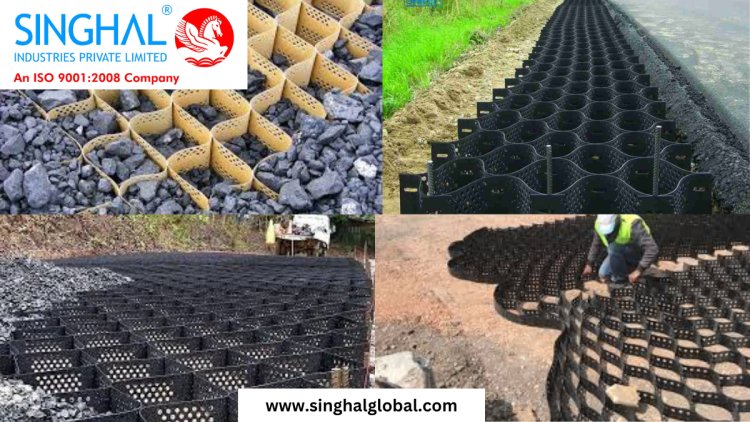Understanding Geocells: An Innovative Solution for Soil Stabilization
Geocells, also known as cellular confinement systems, are a revolutionary technology in the field of geotechnical engineering. These three-dimensional structures are made from high-density polyethylene (HDPE) or other geosynthetic materials, designed to improve soil stability, prevent erosion, and enhance load distribution. As the demand for sustainable construction practices increases, geocells have gained popularity in various applications, particularly in India. This article will explore the benefits of geocells, identify key geocell manufacturers and suppliers in India, and answer common questions regarding their usage and material sourcing.
Share this Post to earn Money ( Upto ₹100 per 1000 Views )

Geocells, also known as cellular confinement systems, are a revolutionary technology in the field of geotechnical engineering. These three-dimensional structures are made from high-density polyethylene (HDPE) or other geosynthetic materials, designed to improve soil stability, prevent erosion, and enhance load distribution. As the demand for sustainable construction practices increases, geocells have gained popularity in various applications, particularly in India. This article will explore the benefits of geocells, identify key geocell manufacturers and suppliers in India, and answer common questions regarding their usage and material sourcing.
What Are Geocells?
Geocells are honeycomb-like structures that can be filled with soil, gravel, or other materials to form a stable foundation. When deployed, they confine the infill material, providing additional support and reducing lateral movement. This makes geocells particularly effective for:
- Erosion Control: By providing a stable surface, geocells prevent soil erosion on slopes and riverbanks.
- Load Distribution: Geocells help distribute loads over a wider area, making them suitable for applications like road construction, parking lots, and other heavy-load scenarios.
- Ground Stabilization: They reinforce weak or unstable soils, enabling construction in areas that would otherwise be unsuitable for development.
Benefits of Using Geocells
-
Improved Soil Stability: Geocells significantly enhance the load-bearing capacity of soils, allowing for construction on challenging terrains.
-
Cost-Effective Solution: Using geocells can reduce the amount of material needed for construction projects, resulting in lower material and labor costs.
-
Sustainability: Geocells are often made from recyclable materials, contributing to environmentally friendly construction practices. They can also promote vegetation growth, further enhancing soil stability.
-
Versatile Applications: Geocells can be used in a variety of applications, including roadways, slope protection, landfill covers, and retaining walls, making them suitable for diverse industries.
-
Quick Installation: Geocells are relatively easy to install, requiring less labor compared to traditional methods of soil stabilization. Their lightweight nature also simplifies transportation and handling.
Leading Geocell Manufacturers and Suppliers in India
As the demand for geocells rises, numerous geocell manufacturers and Geocell suppliers in India are stepping up to provide high-quality products. Here are some prominent geocell manufacturers and suppliers:
-
GeoTech Solutions: This company specializes in manufacturing geocells and other geosynthetic materials. Their focus on quality and innovative designs has made them a leader in the industry.
-
Shivam Geosynthetics: Known for their extensive range of geosynthetic products, Shivam Geosynthetics offers durable and effective geocells. They cater to various applications, ensuring customer satisfaction through quality and service.
-
GEO Products: As a well-known Geocell manufacturer in India, GEO Products provides a variety of geosynthetic solutions, including geocells. Their commitment to research and development has positioned them as a trusted supplier in the market.
-
Apex Geosynthetics: Apex specializes in geosynthetic products, including geocells and geotextiles. They focus on environmentally friendly solutions, offering products that meet international standards.
-
Geocell Material in Ahmedabad: Ahmedabad is becoming a hub for geocell production, with several manufacturers in the region providing high-quality Geocell material in Ahmedabad. Companies in this area are leveraging local resources to produce durable geocells that meet various engineering requirements.
The Cost of Geocells in India
When considering the use of geocells, understanding their cost is essential. The price of geocells can vary based on several factors:
-
Material Quality: The type of material used (e.g., HDPE, polypropylene) will influence the cost. Higher-quality materials may come at a premium but offer better durability and performance.
-
Manufacturing Processes: Advanced manufacturing techniques that enhance the strength and performance of geocells may result in higher prices. However, these investments often lead to long-term savings through improved project outcomes.
-
Customization: Custom-sized geocells or those designed for specific applications may incur additional costs. It’s essential to communicate your requirements with suppliers to get accurate quotes.
-
Bulk Orders: Purchasing geocells in bulk can lead to significant savings, as many manufacturers offer discounts for larger quantities.
FAQs About Geocells
1. What are the primary applications of geocells?
Geocells are primarily used for erosion control, soil stabilization, load distribution, and as retaining structures. They are applicable in road construction, landscaping, landfill management, and agricultural practices, among others.
2. How do geocells compare to traditional soil stabilization methods?
Geocells offer several advantages over traditional methods, including reduced material requirements, lower costs, and faster installation. They are also more environmentally friendly, promoting vegetation growth and sustainable practices.
3. How long do geocells last?
The lifespan of geocells can vary based on environmental conditions and material quality. Typically, high-quality geocells made from HDPE can last for several decades when installed correctly and maintained properly.
















